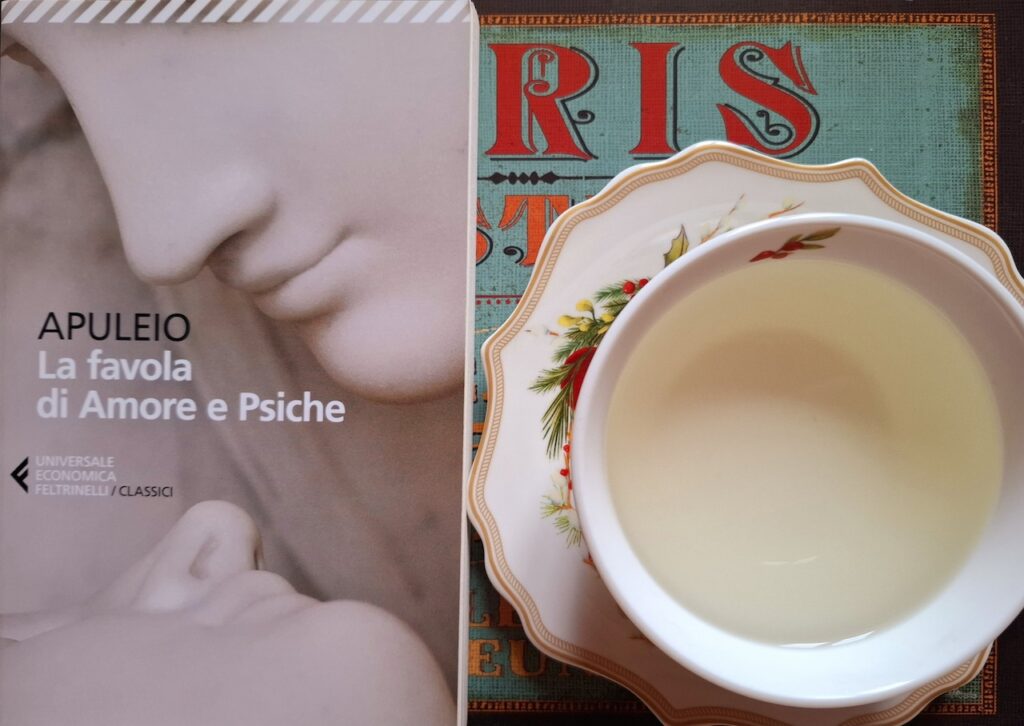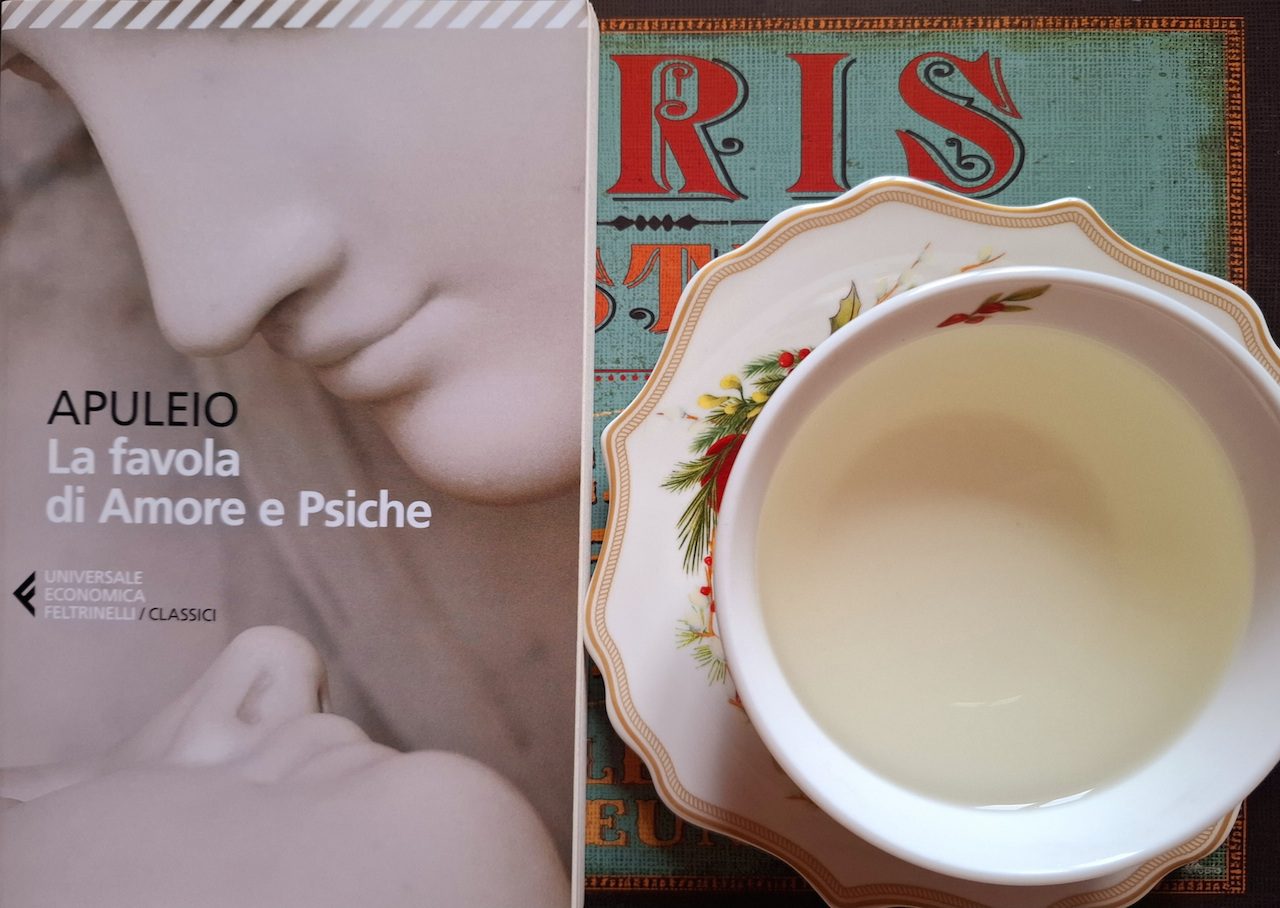Mi ha sempre affascinato questa storia, senza contare che sono una grande appassionata di mitologia e di arte greco-romana.
Questa favola greca ci racconta il gioco di proiezioni dalla fase dell’innamoramento alla coppia consolidata. Il gioco degli opposti tra Amore (il maschile) e Psiche (il femminile), il giusto equilibrio che ci serve per non cadere unicamente nella trappola dell’attrazione fisica e del batticuore, ma che superando le difficoltà conosce il vero amore senza averne più timore.
Ho sempre avuto una passione per il famoso scultore Antonio Canova e della celeberrima scultura di Amore e Psiche che si trova al Louvre di Parigi. Non dimentichiamo che in Veneto a Possagno in provincia di Treviso, a pochi passi da noi c’è il Museo dedicato a questo artista dove lui nacque ed operò. Qui c’è un’altra versione di Amore e Psiche che tiene tra le mani una farfalla, eterno simbolo di cambiamento e trasformazione.
Ho moltissimi ricordi legati a questo mito, alcuni proprio legati alle relazioni sentimentali, mi spiace solo non aver ancora avuto modo di visitare il Museo come avrei voluto, anche se, se n’era parlato…e per ora mi sono accontentata di vederlo in un piacevole documentario al cinema.
Rileggere questo racconto accanto a un buon tè delicato dona una sensazione di pace e ti riporta indietro nel tempo.
Ma parliamo del mito di Amore e Psiche e il perché è spesso associato alle relazioni.
Esistono tre fasi nella relazione: innamoramento (fusione), differenziazione (proiezione), consolidamento (riflessione ed evoluzione). Nella prima fase ci sentiamo un tutt’uno con l’altro, mentre la fase della proiezione è quella in cui parti della nostra ombra vengono trasferite sull’altra persona. Questa è la fase più delicata del rapporto, perché se non si supera e se non si trovano delle mediazioni nelle reciproche differenze comunicando, la relazione è destinata a fallire, perché appunto non siamo anime gemelle, ma anime diverse. La terza fase è quando l’altra persona diventa lo specchio della nostra anima e ci permette di crescere ed evolvere accanto a lei in un rapporto sano, ma possiamo farlo solo restando obiettivi e imparando a conoscere l’altro sul piano della realtà e non dell’ideale che ci siamo fatti.
Mi piace molto ricordare una frase di Bert Hellinger dal suo libro “I due volti dell’amore”:
“L’amore, nella coppia, richiede una rinuncia al primo amore profondo della nostra vita, quello di figli verso i genitori. Solo quando l’attaccamento di un bambino, che può esprimersi sotto forma di amore o di risentimento, verso una madre viene meno egli potrà donarsi totalmente alla sua compagna e diventare un uomo adulto. Affinché un rapporto di coppia possa realizzarsi appieno, è necessario che il nostro primo legame con i genitori, quello dei maschi con la madre e delle femmine con il padre, venga sacrificato e si trasformi.”
Ecco la relazione di Amore e Psiche che si trasforma in farfalla.
Bert Hellinger ci dice anche che al termine della fase della proiezione e integrati reciprocamente gli opposti, l’uomo torna ad essere uomo e la donna torna ad essere donna.
Nel testo “Il Femminile nella Fiaba” di Marie-Louise von Franz edito da Bollati Boringhieri, le reciproche proiezioni avvengono attraverso Anima ed Animus.
Citazione dell’autrice: “la donna esercita un’influenza sull’Anima dell’uomo, così come l’Anima dell’uomo la esercita sulla donna. La donna educa e trasforma l’Eros dell’uomo”.
Potremmo dire quindi che Psiche è Anima che educa Amore (Eros).
Se siamo in preda solo ad Anima rischieremo l’annullamento per Amore mentendo a noi stesse, se siamo in preda solo ad Animus il suo annientamento attraverso l’animosità, per questo dobbiamo imparare ad ascoltare il nostro dialogo interiore, soprattutto quando entra in conflitto al fine di portarvi accettazione, per comprendere con il giusto distacco e la giusta prospettiva come integrare gli opposti e imparare ad esprimere i nostri reali bisogni senza autosvalutarci. Anima e Animus rappresentano il femminile e il maschile dentro di noi, che vanno integrati al fine di formare l’intero, il nostro Io, il nostro centro, la nostra vera essenza ed autostima e questo può avvenire solo mantenendo attiva la propria creatività (un po’ come la sottoscritta fa con questo blog). Quando integriamo l’Ombra diventiamo esseri concentrati e inviolabili, mantenendo calma e autorità.
Anima e Animus in armonia danno vita al Sè in pace con se stesso. Solo da questo umile, sincero e rispettoso centro possiamo conoscere veramente l’altro in una reciproca conoscenza fatta di reale compassione e non forzando gli eventi attraverso strategie e manipolazioni (motivo per cui personalmente me ne levo appena ne percepisco il sentore). La donna dovrebbe essere meno animosa o crocerossina e più creativa, l’uomo meno protettivo e più compassionevole al fine di integrare gli opposti e comprendersi in profondità. Non è attraverso l’impulso che ci si può connettere veramente a un altro essere, ma parlando dal cuore e dal nostro centro, mettendo da parte il proprio egoismo, narcisismo e orgoglio, dimostrando la propria lealtà apprezzando l’altro.
Nell’Arte di Amare di Erich Fromm invece riconosciamo che la relazione risiede nella capacità di impegnarsi veramente e di scegliere di amare una sola persona con umiltà, fede e coraggio. La fase dell’innamoramento prima o poi deve svanire per lasciare posto a una coppia adulta e consapevole.
Secondo Erich Fromm quando scegliamo di stare con qualcuno “non deve esserci altro di più importante.”
Il nostro lato ombra ci indica attraverso la proiezione che abbiamo ancora alcuni lati di noi stessi sui quali lavorare per superare la solitudine e raggiungere l’unione. E’ abbastanza naturale che il maschile sfugga la fusione col femminile per il timore di impegnarsi e perdere i propri spazi, così come il femminile temi il tradimento e l’abbandono. Un amore maturo non si fonde totalmente con l’altro, ma mantiene la propria individualità e integrità comunicando e agendo sui reciproci bisogni.
Come dice Erich Fromm: “due esseri diventano uno e tuttavia restano due” dove ognuno dona se stesso all’altro e viceversa per arricchirsi a vicenda.
Alle basi di una relazione sana deve esserci: premura, responsabilità, rispetto.
Noi amiamo attivamente quella persona per la vita e per la sua crescita, quindi diventiamo responsabili attraverso i nostri comportamenti anche delle sue emozioni. Responsabilità deriva da rispondere, quindi significa essere pronti e capaci di rispondere al fine di amarla, prendersene cura e non ferirla. In questo caso dobbiamo avere a cuore i bisogni psichici dell’altra persona e mettere da parte nostre parti egoistiche o narcisistiche, come l’opportunismo e il desiderio di fare quello che vogliamo senza pensare se quell’atteggiamento può o meno ferire l’altro. Occorre conoscere l’altra persona, proprio perché non è come noi e riuscire attraverso la compassione a capire veramente cosa prova, cosa sente e cosa pensa, solo così si può entrare in profondità con l’altro e permettere al rapporto di rinnovarsi ogni giorno. L’amore è un atto di volontà di unirsi per la vita.
Una coppia sana valorizza tutte le qualità dell’individuo in una collaborazione reciproca adattandosi anche ai bisogni dell’altro, comunicando dal centro del proprio essere in discussioni costruttive e mai distruttive, nè fuggendo dal confronto. Un rapporto d’amore deve basarsi sulla totale sincerità pena la perdita della fiducia data.
Non sono una grande amante di Osho anche se nel saggio “Con te e senza di te” offre degli ottimi spunti sulle relazioni, su come sia importante prima stare bene anche da soli per poter amare un altro essere e su come a volte l’amore è anche lasciare andare.

La favola di Amore e Psiche – di Apuleio edito da Feltrinelli nel 2020 – Photo@Veru
The Tale of Eros and Psiche

I have always been fascinated by this story, not to mention that I am a great fan of mythology and Greco-Roman art.
This Greek fable tells us about the game of projections from the phase of falling in love to the consolidated couple. The game of opposites between Love (the masculine) and Psyche (the feminine), the right balance that we need to not fall only into the trap of physical attraction and heart palpitations, but that by overcoming difficulties knows true love without fearing it anymore.
I have always had a passion for the famous sculptor Antonio Canova and the very famous sculpture of Cupid and Psyche that is located at the Louvre in Paris. Let’s not forget that in Veneto in Possagno in the province of Treviso, a few steps from us there is the Museum dedicated to this artist where he was born and worked. Here there is another version of Cupid and Psyche holding a butterfly in his hands, an eternal symbol of change and transformation.
I have many memories linked to this myth, some of them linked to romantic relationships, I’m only sorry I haven’t had the chance to visit the Museum as I would have liked, even if it was talked about.
Rereading this story next to a good, delicate tea gives a feeling of peace and takes you back in time.
But let’s talk about the myth of Cupid and Psyche and why it is often associated with relationships.
There are three phases in a relationship: falling in love (fusion), differentiation (projection), consolidation (reflection and evolution). In the first phase we feel one with the other, while the projection phase is when parts of our shadow are transferred to the other person. This is the most delicate phase of the relationship, because if it is not overcome and if we do not find mediations in the mutual differences by communicating, the relationship is destined to fail. The third phase is when the other person becomes the mirror of our soul and allows us to grow and evolve alongside them in a healthy relationship, but we can only do this by remaining objective and learning to know the other on the level of reality and not the ideal we have of that person.
I really like to remember a phrase by Bert Hellinger from his book “The Two Faces of Love”:
“Love, in a couple, requires a renunciation of the first deep love of our life, that of children towards their parents. Only when the attachment of a child, which can express itself in the form of love or resentment, towards a mother is lost will he be able to give himself totally to his partner and become an adult man. In order for a relationship as a couple to be fully realized, it is necessary that our first bond with our parents, that of males with their mother and females with their father, is sacrificed and transformed.”
Bert Hellinger also tells us that at the end of the projection phase and when the opposites are mutually integrated, the man returns to being a man and the woman returns to being a woman.
In the text “The Feminine in the Fairy Tale” by Marie-Louise von Franz published by Bollati Boringhieri, the reciprocal projections occur through Anima and Animus.
Author’s quote: “the woman exerts an influence on the Anima of the man, just as the Anima of the man exerts it on the woman. The woman educates and transforms the Eros of the man”.
We could therefore say that Psyche is the Anima that educates Love (Eros).
If we are only in the grip of Anima we will risk being annulled by Love by lying to ourselves, if we are only in the grip of Animus its annihilation through animosity, for this reason we must learn to listen to our internal dialogue, especially when it comes into conflict in order to bring acceptance to it, to understand with the right detachment and the right perspective how to integrate opposites and learn to express our real needs without self-devaluation. Anima and Animus represent the feminine and masculine within us, which must be integrated in order to form the whole, our Self, our center, our true essence and self-esteem and this can only happen by keeping one’s creativity active (a bit like the undersigned does with this blog). When we integrate the Shadow we become concentrated and inviolable beings, maintaining calm and authority.
Anima and Animus in harmony give life to the Self in harmony and at peace with itself. Only from this humble, sincere and respectful center can we truly know the other in a mutual knowledge made of real compassion and not by forcing events through strategies and manipulations (which is why I personally get out of it as soon as I get a whiff of it). The woman should be less spirited or a Red Cross nurse and more creative, the man less protective and more compassionate in order to integrate opposites and understand each other deeply. It is not through impulse that we can truly connect to another being, but by speaking from the heart and from our center, putting aside our selfishness, narcissism and pride, demonstrating our loyalty by appreciating the other.
In Erich Fromm’s The Art of Loving he tells us instead that the relationship lies in the ability to truly commit and to choose to love a single person with humility, faith and courage. The phase of falling in love must sooner or later vanish to make room for an adult and aware couple.
According to Erich Fromm, when we choose to be with someone “there must be nothing more important.”
Our shadow side shows us through projection that we still have some sides of ourselves to work on to overcome loneliness and achieve union. It is quite natural that the masculine avoids fusion with the feminine for fear of commitment and losing their own space, just as the feminine fears betrayal and abandonment. A mature love does not merge totally with the other, but maintains its own individuality and integrity.
As Erich Fromm says: “two beings become one and yet remain two” where each gives themselves to the other and vice versa to enrich each other.
The foundations of a healthy relationship must be: care, responsibility, respect.
We actively love that person for life and for their growth, so we become responsible through our behaviors also for their emotions. Responsibility comes from responding, so it means being ready and able to respond in order to love them, take care of them and not hurt them. In this case we must care about the psychological needs of the other person and put aside our selfish or narcissistic parts, such as opportunism and the desire to do what we want without thinking about whether or not that attitude can hurt the other. We need to know the other person precisely because they are not like us and be able to truly understand through compassion what they feel, what they hear and what they think, only in this way can we enter deeply with the other and allow the relationship to renew itself every day. Love is an act of will to unite for life with another person.
A healthy couple values all the qualities of the individual in a mutual collaboration, also adapting to the needs of the other, communicating from the center of their being in constructive and never destructive discussions or running away from confrontation. A love relationship must be based on total sincerity.
I’m not a big fan of Osho even though in the essay “With You and Without You” he offers some excellent ideas on relationships, on how important it is to first feel good even when you’re alone in order to love another being and on how sometimes love is also letting go.



No responses yet